#I guess all these are sort of correlate to MBTI
Explore tagged Tumblr posts
Text
How Te and Ti works
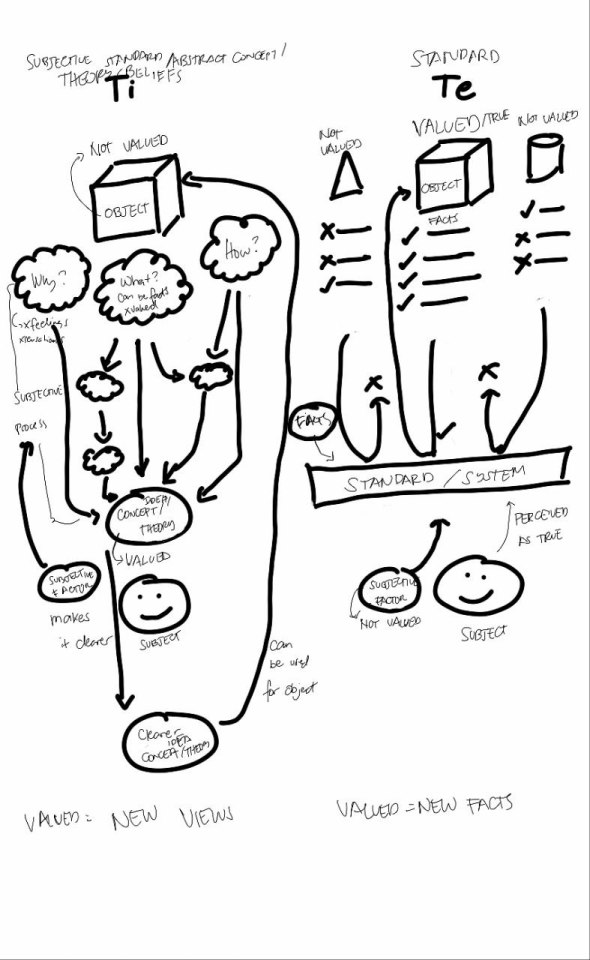
I was to stop making new ones for functions but I guess my interest came back for these. I haven’t fully grasped what the other functions are, but these are my initial thoughts for them. It would have been better to parallel Fi and Ti since they are technically similar but my previous posts paired both extroverted and introverted of one function, so I’ll just stick to it. I can’t find a mirror between both on how they work similar to what happens with Se and Si so I just drew it as how I understood it. Terms: OBJECT - anything that is real/present or can be perceived, event SUBJECT - you, the person doing the perception SUBJECTIVE FACTOR - past/present/future, experiences, etc. FACTS - definitions that are tangible or are true
INTROVERTED THINKING (Ti Dominant) - ITJ
First of all, I don’t see Accuracy as the main word for the function which is described by MBTI. It may be the end product though. It can be, in its core, correlated with PERSPECTIVE or just to be safe we can use CONCEPTS/THEORIES
- What Ti does is it usually sees an object or event which then an abstract thought pops up (sometimes it does this spontaneously) usually leading to a concept/theory which is still blurred. It then takes different perspectives of an object or objects breaking it down finding things that can justify on the concept/theory until it is finally formed/concluded. It feels like you’re trying to build something by looking on different things in different ways. When it is finally concluded, then this concept can be used on different objects/events. An example would be this theory I had when I was still in college about “smart people being generally skinny”. It started with the thought of thinking/reading books/and using your brain needs a lot of glucose -> glucose is depleted thus fat is not stored (Yes fat comes from unused glucose). I then started observing the top students and true enough they are usually skinny or average in weight and included in different factors as well. But I never did conclude this theory because there are other factors that can still come into play.
MBTI or psychology in itself is full of concepts and theories that the Ti dom / Ti function would like to play and enjoy with since most of it are intangible.
Some Statements (not mine) about Ti which I found in a blog explaining Chapter X:
- I personally have a sort of Ti standard that if you cannot put it into simple terms then you do not understand it yourself. I feel negative when someone says, “It’s extremely complex, too hard to explain” Sure it takes time to make things simple and concise but don’t blame others for our own lack of Fe work and then belittle them, “You wouldn’t get it.” If you can’t Te and Fe it, then nobody can get it or trust that you yourself got it.
- That is because to attack his most function is to attack him. That is like a direct attack not to mention he does not trust the Fe to sympathize with the attacker. Not that he will attempt to press anyone with his convictions, but he will break out with retorts against every criticism, however just.
EXTROVERTED THINKING (Te dominant) - ETJ
Same with Ti, Te is not in its nature about Effectiveness. It can lead to everything being effective but the function itself is more of STANDARDIZATION. It’s not about having organizational skills or about scheduling as what MBTI describes.
- What Te does is that it collects a lot of facts and produces this what I believe is a filter. This filter is what we call a STANDARD/ SYSTEM. I’m not really sure how it is made but it’s there. Then with this standard it judges an object with facts about it and when all of the facts presented are true which then the object can be valued or is considered true.
An example would be an ENTJ friend of mine who shares about this “list of things to look for to consider her perfect boyfriend for her” which includes a basketball player, taller than her, smarter than her, more dominant, etc. And everyone who does not fit that criteria are all rejected and not given a chance at all. You may call them having high standards but that is what they perceive is true. Another instance would be having coworkers that are not up to her standards, she usually despises them, and she usually just does the work because she believes she can only trust herself.
Usually, they are skeptical to things that are not tangible to them or out of this world (ghosts).
Some Statements (not mine) about Te which I found in a blog explaining Chapter X:
- Te “produces” new facts that lead to mainstream truth. Concepts are “synthetic” and “predicative”. I think he (Carl Jung) is getting at the concept of gather vs organize here and noticing that Te is gathering for the mainstream good. It is going out and obtaining new data for them.
18 notes
·
View notes
Text
MBTI functions vs SHC
Oh boy. So, I actually had the theory for this post since before I started this blog, meaning it's been sitting in my drafts, 80% done, for the past few months. Y'all can thank @arisruby and @starry-sky-stuff for this post which finally spurred me into finishing.
Now, please prepare for a train wreck of thoughts.
Disclaimer
Take this with a grain of salt! Actually, no. Go open a bag of potato chips. That is how much salt you need to take this with. This is just a theory; I have no data to back this up. Well, unless you count an abysmal sample size of… ten per type or so. (I believe starry-sky-stuff has already compiled some numbers on the subject, but I've yet to check it out.) It’s also important to note that I’m talking loose correlations, not rules. There are going to be exceptions. Lots of exceptions. People are complicated, and I am also going to oversimplify things in hopes of getting to the root of something. I guess we’ll see by the end of this if it was worth anything.
The Basics and Why One-to-One Doesn't Work
I want to be perfectly clear here, I am NOT saying that if you're X type according to MBTI, then you're Y sorting. There may be sixteen of both types and innate sortings, but these systems are too unique and different for one-to-one correlations. In fact, I think it's a mistake to compare sortings to types. Instead, I want to compare the building blocks of each systems: the primaries and secondaries versus the cognitive functions.
For those unfamiliar, the cognitive functions are what MBTI is based off of. You remember the middle two letters of your MB type? They could be either Sensing (S) or iNtuition (N) and Thinking (T) or Feeling (F). Those are the four categories of the functions, and each of them can be Extraverted (e) or Introverted (i). Please note extroversion and introversion here don’t refer to how we deal with people, but whether a function is focused on the external world (reality around us) or our internal world (what’s happening in our heads). That leaves us with eight functions total: Extraverted Sensing (Se), Introverted Sensing (Si), Extraverted iNtuition (Ne), Introverted iNtuition (Ni), and so on (Te, Ti, Fe, Fi).
We all have the potential to use all eight functions, but based on our personality we naturally prefer some over others. According to most interpretations, we use only four of them consciously, with two of them, your dominant and auxiliary functions, in the driver’s seat a vast majority of the time. The functions are also set on axes: a Judging axis (Thinking and Feeling) and a Perceiving axis (Sensing and iNtuition). If one end of your axis is extraverted, the other will be introverted (Se and Ni go together, Te and Fi go together, etc.). Your dominant and auxiliary functions will always be from different axes (one Judging, one Perceiving), so your top four functions will consist of one from each category (one Thinking, one Feeling, one Sensing, one iNtuition).
Confusing enough for you? I'm leaving a lot out for simplicity's sake, but as long as you know your MB type, you should easily be able to look up your cognitive functions, and I'll reference which types have the function as dominant or auxiliary in this post.
But back to the comparison with SHC sortings! The last point I'll make before we start is that even looking at the functions versus primaries and secondaries, there is still no one-to-one comparison. I theorize that all of the functions have correlations with at least two primaries or secondaries. Also, SHC has a layer of complexity MBTI can't address in the form of models. If a model is strong enough, it will show up in your MB type more than your innate. This is also true for primaries that look more like other primaries on the surface, like a Bird primary that is heavily Badger flavored or a Lion without a cause that looks like a Snake. A lot of online MB tests will have trouble distinguishing these types of nuances.
...Okay. So, now that I've explained why I'm trying to have you consume your entire daily recommendation of sodium with this post, let's get to the fun stuff!
The Correlations
Extraverted Sensing (Se): Se is concerned with what is happening right now in the physical world around them. Expect a correlation to the Improvisational secondaries, Lion and Snake. Improvisational secondaries tend to be very aware of their surroundings, taking in what is on hand and reacting with their gut in the moment. Think Luffy’s (One Piece) Lion secondary or think Bender’s (Futurama) hedonistic Snake secondary. Both live joyously in the moment, always seeking out whatever is new and fun.
Dominant Se: ESFP, ESTP
Auxiliary Se: ISFP, ISTP
Introverted iNtuition (Ni): Ni is on the opposite side of the axis as Se. Instead of living in the moment, people with a strong Ni function would be happy to live in their heads. They can get so engrossed in their thoughts, they’ll block everything else out and tend to have flashes of intuitive inspiration. I suspect there is a correlation with the Built secondaries, Badger and Bird. The Ni function is focused on observing context and interpreting meaning through patterns, whether that is through a Bird collecting or a Badger connecting. Think Beth Harmon (The Queen's Gambit) and her Bird secondary or Will Graham's (Hannibal) Badger secondary. Both of them have flashes of insight that almost seem mystical to those around them, Beth when she's playing chess and Will when he's seeing into the minds of others. In reality, these flashes of insight are from recognizing patterns from everything their secondaries have built over time.
Also, for those who have a strong Ni function, I believe there is a correlation to the Internal primaries, Snake and Lion. Being "in their heads" as often as they are, Ni dominant people are more in tune to their inner voice in the same way that Internal primaries are, whether their inner voice is focused on their cause or their people. Think Elsa's (Frozen) Lion primary or Yennefer's (The Witcher) Snake primary.
Dominant Ni: INFJ, INTJ
Auxiliary Ni: ENFJ, ENTJ
Introverted Sensing (Si): Si works by comparing what is happening in the present to the past and believes that if something happened one way before, it should work that way again. Si users tend to have a linear way of thinking: once they commit to doing something one way, they commit. It's only through experiencing difficulties with their chosen path that they may change their mind. I’d expect a correlation to what I refer to as the Straightforward secondaries, Badger and Lion. Think of Watson's (ACD Sherlock Holmes) Lion or Castiel's (Supernatural) Badger secondary. Once they set down a path, it takes a major event to steer them off it, and the people close to them know it's no use trying to argue otherwise.
In people with a strong Si, I'd also expect a correlation with the Loyalist primaries (higher correlation in Badger, lesser in Snake) because Si tends to value tradition (if this was good experience last time, it will be this time too) and duty (they needed me to do this in the past, they need me now). These can be cultural or more personal traditions, duty to the community or to a person's circle. Think Din Djarin's (The Mandalorian) Badger primary or Samwise's (LotR) Snake primary, and both of their intense senses of duty and insistence on upholding traditions. Even when thrust into new situations, Sam refers to the way his old Gaffer did things back home and Din refers to the code he grew up with.
Dominant Si: ISFJ, ISTJ
Auxiliary Si: ESFJ, ESTJ
Extraverted iNtuition (Ne): Ne users are unafraid to experiment. They are opposite on the axis from Si, and instead of linear thinking, they see potential solutions all around them. Expect a correlation with the Circumventing secondaries, Snake and Bird. Think Michael’s (The Good Place) Bird secondary. Consider how he pushed for a new way of doing things when he suggested the Neighborhood, and kept throwing new ideas at the wall, hoping for something to stick during all the resets. Or think Jack Sparrow's (Pirates of the Carribean) Snake secondary, and how he fights. Instead of just reacting to the chaos, he usually has a hand in causing it, seeing opportunity everywhere and searching for every advantage. Or consider Aang and Toph (AtLA) when Toph first started training Aang. Aang wanted to come at the boulder from a different angle, using his Ne Snake, but Toph objected with her Se Snake, demanding Aang face what was right in front of him.
Dominant Ne: ENFP, ENTP
Auxiliary Ne: INFP, INTP
Extraverted Feeling (Fe): Fe users value social harmony and bringing people together. They tend to focus their decisions on how it affects the group rather than individuals. If that isn’t a people-driven Badger primary, I’m not sure what one is. You’ll also see Paragon Lions with with a strong Fe function. Think Steven Universe’s Badger primary or Wonder Woman’s (DC Comics) Lion primary. Doing what's best for people is their top priority, whether that means getting people to talk to each other or fighting to protect them. Other people come first, often above their own desires.
I would also expect a correlation between the Fe function and the Fluid secondaries, Badger and Snake. The ability to read their audience, see what they need, and become it, is related to the Fe function's focus on understanding the thoughts and feelings of others. Think Ochako Uraraka's (My Hero Academia) or Aziraphale's (Good Omens) Courtier Badgers and how attuned to others' feelings they are and how they use politeness to smooth over ruffled feathers. Or consider Woody (Toy Story) and how he uses his Snake secondary, not only to keep peace in his community but to manipulate them into doing what he believes is best.
Dominant Fe: ENFJ, ESFJ
Auxiliary Fe: INFJ, ISFJ
Introverted Thinking (Ti): Ti users create systems in their heads to explain the world and compare new information to these systems to see if it fits with their system or if they need to adjust their system. And yes, that is a Bird primary. I would also expect a correlation with the other Constructed primary, Snake. Think Abed (Community) and his Bird primary, a system constructed from movies and television. Think Katniss (Hunger Games) and how her Snake primary understands the world through her love of her sister. Both characters trust their own analysis of new situations and their internal guiding system over outside opinions.
I'd also expect a correlation with Bird secondaries to go with the Ti function's desire for new information to help satisfy their desire for a deeper understanding of things around them. Think Hiccup (How to Train Your Dragon) and his Bird secondary. His curiosity is what keeps him going back into the woods to study Toothless before bonding with the dragon. After that, he collects information about what Toothless likes and dislikes, and filters it through his Ti function, allowing him to make the logical leap that all dragons, no matter their shape or size, may like garlic grass or be incapacitated by a scratch under the chin.
Dominant Ti: INTP, ISTP
Auxiliary Ti: ENTP, ESTP
Extraverted Thinking (Te): People with a strong Te function make their decisions based on external data. They try to be impartial to their own feelings and depend on objective facts instead. Expect a correlation to the External primaries, Bird and Badger, though these Badgers and Birds lean more External than Felt or Constructed respectively. In other words, Te Badger primaries are usually Badgers that are more loyal to traditions and rules than Fe driven, people-oriented Badgers. Te Badgers are more likely to explode into Authoritarian Badgers while Fe Badgers are more likely to explode into Martyr Badgers. Te Birds differ from Ti Birds in that they tend to find their system while Ti Birds construct theirs. Think Draco Malfoy's (Harry Potter) Badger primary or Sokka (AtLA) and his Bird primary. At the start of their stories, both lean heavily on their traditions and have rather black-and-white thinking. Things are either true or they aren't. As they experience new things and accept more data as true, Sokka readjusts his system, and Draco slowly shifts his loyalties.
Seeing as Te users base their understanding of the world off of external sources, gathering information is vital to their experience. Expect a strong correlation with Bird secondaries. Te users also greatly value efficiency and pragmatism. The result is more important than the process, meaning there's likely a correlation with the Improvising secondaries. It should be noted, however, that Te users carry this need for efficiency into their relationships. They tend to be blunt and concise: these are the facts, and this is what matters. This means any Fluid secondaries with this function are likely to favor their Neutral state. Think Hamilton's Lion, Mike Wazowski's (Monsters, Inc.) Bird, or Adora Belle's (Discworld) Neutral Snake. These are characters who are confident in what they perceive to be the truth and are unafraid to share that truth with people, whether they want to hear it or not. They like to get to the point, both socially and when tackling obstacles.
Dominant Te: ENTJ, ESTJ
Auxiliary Te: INTJ, ISTJ
Introverted Feeling (Fi): Fi users make decisions based on their personal feelings and values. They're guided first and foremost by their internal sense of right and wrong. Expect a correlation to the Internal primaries, Lion and Snake. Think Mabel Pines (Gravity Falls) and her Lion primary or Wanda Maximoff (MCU) and her Snake primary. Both are so driven by their feelings that when presented with a reality that caters specifically to them, Mabel with everything she finds fun and Wanda with a happy family, they have trouble leaving, even when they know it's fake. Or consider Marius’s (Les Mis) Snake primary. “Red and Black” even has a few lines that are a clear argument between Marius’s Fi Snake and Enjoras’s Fe Lion. Enjoras argues that their individual feelings (Fi) are not as important as what’s important to everyone (Fe), but Marius is so stirred by his meeting with Cosette that it takes a bit before he can agree with Enjoras's vision.
I would also expect a correlation between the Fi function and Bird primaries. Instead of Ti Birds who have a constructed system of conscious thought, or Te Birds who have a system of empirical facts and truths they've gathered, Fi Birds have a system constructed from their feelings. Fi is always asking "How do I feel about this?" In some people, this presents like a driving force, steering their decisions, but in others their inner love or repulsion for things is a series of values they must pit new information against before their decision is clear. Think Luke (Star Wars) and his Bird primary. While his system is easily molded by advice from Obi-Wan and Yoda, at the end of the day, his feelings are what guide him. He goes to Cloud City to save Han and Leia against Yoda's teachings because he felt it was the right thing to do. Same with saving Vader when everyone around him was telling him he was wrong.
People with a strong Fi also tend to place value in being true to themselves and may dislike when people put on masks or edit their opinions to keep social harmony. I'd expect a high correlation with Lion secondaries like Harry Potter, Ralph (Wreck-It Ralph), or San (Princess Mononoke).
Dominant Fi: INFP, ISFP
Auxiliary Fi: ENFP, ESFP
Final Thoughts
Those who are familiar with function stacks have probably already realized that my analysis here has in effect said that any type can be any sorting if they manage to develop their lower functions. So, this post has been completely pointless-- No! Hey, I said from the beginning we were looking at correlations, not rules. And that does make some sense, right? People and characters who spend time bolstering their weaknesses or who have lived a long time tend to pick up models along the way. People are constantly changing throughout our lives as we gain new experiences. @air-in-words has a fascinating post highlighting how these personality tests tend to only capture pieces of us, our nature or how we were nurtured.
(Also, I'm thinking function "grips" and "loops" may relate to how certain primaries will look like other primaries when they burn. But all of that is another post!)
Anyway, hope you had as much fun with this analysis as I did. Y'all feel free to tell me how far off I am with this! I'd love to see people tag their sorting and MB type so we can get some more data. Thanks for reading!
And thank you to all the lovely people who I referenced sortings from: @wisteria-lodge, @dragonsaredorks, @paint-the-ravenclaw, @awinterrain, @everyonewasabird, @the-phoenix-heart, @sortinghatchats
tl;dr
Bolded are what I believe are the higher correlated sortings. Sorry, for no help with the primaries ENTJs.
ESFP (SeFi): Lion, Snake/Lion, Snake
ESTP (SeTi): Bird, Snake/Lion, Snake
ISFP (FiSe): Lion, Snake, Bird/Lion, Snake
ISTP (TiSe): Bird, Snake/Bird, Lion, Snake
INFJ (NiFe): Lion, Snake/Badger, Bird
INTJ (NiTe): Lion, Snake/Bird, Badger
ENFJ (FeNi): Lion, Badger, Snake/Badger, Bird, Snake
ENTJ (TeNi): Any/Bird, Lion, Neutral Snake
ISFJ (SiFe): Badger, Lion, Snake/Badger, Lion, Snake
ISTJ (SiTe): Badger, Bird, Snake/Lion, Badger
ESFJ (FeSi): Badger, Lion, Snake/Badger, Lion, Snake
ESTJ (TeSi): Badger, Bird, Snake/Bird, Bookkeeper Badger, Lion, Neutral Snake
ENFP (NeFi): Lion, Snake, Bird/Snake, Bird, Lion
ENTP (NeTi): Snake, Bird/Snake, Bird
INFP (FiNe): Bird, Snake, Lion/Bird, Lion, Snake
INTP (TiNe): Bird, Snake/Bird, Snake
#here take it before I change my mind#a comparison between apples and oranges#sortinghatchats#mbti functions#online mbti tend to skew N over S btw so watch for that#maybe try a function test if you're curious#now time to check those numbers starry collected#and see how far off I am
65 notes
·
View notes
Note
Hi Charity! I took the test you recommended about mbti and instead of infj I got isfj. I was forced to pick concrete over abstract. Abstract is 100% me, always living in the future, dreaming about what the perfect world would be like. I've got my head in the clouds and I am impractical, don't know how to do really simple things like cooking/house cleaning.This test is really strange and therefore not accurate. How can you leave a person taking the test just one option without the possibility to choose, force them to pick it to complete the test and then give the result that obviously can't be accurate as the person wasn't allowed to pick the option he/she wanted? Really strange. But my question is concerning my true type - infj. What are the most widespread correlations between infjs and Hogwarts houses? Can an infj be a true Gryffindor if Gryffindors are known to be quick to act and infjs need time to think and are paralyzed if they have to decide and act quickly? can you please give examples of infjs from different houses? Also what are the most widespread correlations between infjs and enneagram types? As always thanks a lot for answering!
About the test, apparently you are not supposed to take it top-down, but to read through all the options first and then select the two answers that are the most “you,” so that you are allowed to choose the one most representative of your thinking process, then answer the rest in order of preference until no more options exist. The included video talks about this, but per usual, none of the intutives that took it (me included) didn’t bother to watch it, cuz... details. ;)
As for being impractical. Well, I guess you must focus on learning it, yes?
If you read through the Sorting Hat Chats system, you will find that Gryffindors are ‘felt’ houses in that every reaction and response comes from the gut, and they are willing to believe in something so hard they will walk away from their family and friends in order to pursue it. To do otherwise would make them feel wrong and like they are living inconsistently to their value system. You are a Gryffindor if you trust your instincts and are firm in your convictions and would sacrifice relationships for the greater good.
If you have to wait and think about it (aka, using logic and not trusting your gut to tell you what is right and wrong) then you are likely a Ravenclaw, who is using a system of logic and/or detail-seeking before reaching a moral conclusion. The Ravenclaw approaches things analytically and chooses to live according to a system they have created and/or adapted or adopted. (Logic, religious beliefs, etc -- whatever they are into, they train their life to mirror it.)
This stands out in contrast to the Slytherin and Hufflepuff Houses, which are loyalist-based. Slytherins are loyal to a chosen few and would prioritize them over everyone else out of a sense that they don’t have enough love to go around, and Hufflepuffs are loyal to human beings in general, thus compassionate to everyone and angry on behalf of everyone when they see an injustice, whether the injustice concerns them personally or not.
Your type won’t have a huge difference on your House. But off the top of my head, a few examples: Gryffindor Dumbledore vs. Ravenclaw Obi-Wan Kenobi vs. Slytherin Malia Tate vs. Hufflepuff Remus Lupin.
17 notes
·
View notes
Note
Do you think there is any correlations between mtbi and the sortinghatchats system? What about zodiac? Personally, whenever I see someone say aries are gryffindors I get terribly mad and wrap my green scarf a little tighter around my neck.
Lol careful xD
Zodiac? Well I know I'm a Karkat but--
(Kidding.)
I know next to nothing about the zodiac. I'm a Cancer apparently (June 26) but most of the descriptions do noooot fit me. Before anybody goes "but you have to calculate your moon sign!" or something, I don't actually know what time of day I was born so ¯\_(ツ)_/¯
Yeah I don't know anything about that.
MBTI was my special interest when I was 13 though so I know a shit ton about that. I don't think it describes "personality" as much as it describes thought processes.
And the answer to "is there any correlation?" is--maybe. But you have to wander into swampy stereotype territory to speculate about it.
I belonged to Personality Café, an online forum full of people who kinda just... gradually threw out bits of the MBTI system and subtly shaped it until it worked better, which is basically Bird primary in a nutshell. I spent most of my time there on the INTP section of the forums, so maybe there's a correlation. If I remember right, the INTP, INTJ, ENTP, INFP, and maybe INFJ and ISTP forum sections were the most active when I was there. There were also common sections and one where people would go for help typing themselves (I was good at this, I read into people's writing styles for clues).
Unfortunately, since the forum was so heavily skewed toward the intuitive types, especially the Ne users, I don't have as much data as I'd like on the other types.
But let's try anyway.
Please do not take this very seriously.
Stereotypically, Si users (xSxJ, and to a lesser degree INxPs), value tradition. Fe users (xxFJ, and to a lesser degree ExFPs) are said to value community. You could argue these have ties to a form of Hufflepuff primary.
The NTs probably have a slightly disproportionate number of Birds in their ranks, primary and secondary, but this seems too easy of a guess.
Se users (xSxPs, and also ENxJs... I think I'm remembering this right) are described as pretty Lion-y, both primary and secondary. Fi is also pretty Lion primary.
Snakes? I don't know if they have a apecific correlation... I guess you could try saying Te users, but that's just playing into the whole stereotype that ExTJs and so on are all, like, smart ambitious businesspeople.
"This sounds vague."
Because it is. It has to be. MBTI is nowhere near as sturdy of a system as the SHC one, in my opinion. SHC differentiates between how and why, describes the general shape of your philosophy and methods without presuming their contents, and lets you go into a lot more detail with models and performances.
MBTI is kind of weird. The letter types are shorthand for cognitive functions, and Extroverted Thinking (Te) is very different from Introverted Thinking (Ti) but they're represented by the same letter. INTJs and INTPs approach problems very differently, but most people look at the one-letter difference in the initialism and think INTJs just like to keep their desk a little cleaner.
It also introduces a sort if false dichotomy. Te and Ti's differences get underestimated, but Ti and Fi's differences get overestimated. I think they're more similar than even the PerC nerds realized.
So like, I could try to describe myself as an INTP with heavy Fi use on the side, and get a lot of confused people asking what the hell that means. Or I could say I'm a Bird primary with some Lion baked into my system, and nobody thinks that's weird. Also nobody thinks it's too weird that a Bird primary would be an artist and not particularly enjoy math. There are fewer stereotypes tied in here.
Anyway, rant over. This post is kind of a mess but I'm sending it out anyway.
(Oh, and you might be interested to know that Aradia, the Homestuck troll associated with Aries, is totally a Slytherin. She's kinda burned so she looks a bit like a Gryff at first, but she's tooootally a Slytherin.)
5 notes
·
View notes
Note
hi! I would loove some help figuring out my type. I feel like I've been trying to figure it out for years. I'll feel like a type fits me until it doesn't & then another type makes more sense until it doesn't lol so any help would be greatly appreciated! I don't even know where to begin, it's so hard to describe myself ahh because I feel like there's no one thing I could say to peg me down cause itd just be a contradiction. I feel like I fit into every category yet I don't fit anywhere truly. (1)
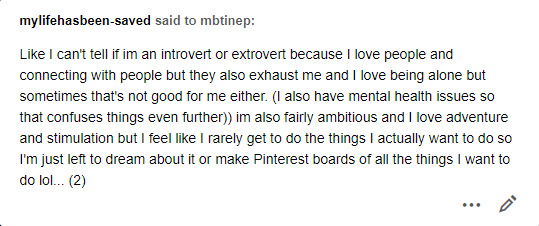

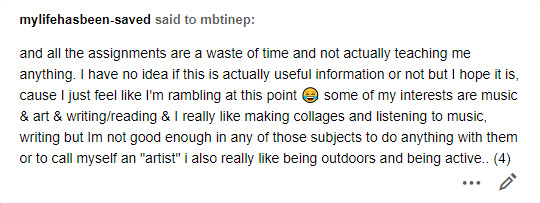


Hello. Thank you for reaching out.
You seem obviously ENFP, almost suspiciously so, but then after I looking at your blog I had the additional guess of ESFP.
–
It is very typical (and known among typology circles) that type-hopping and feeling like no type can quite define you and your endless “contradictions” is an xNFP enneagram 4 “redflag.” The amount of typing help asks sent by xNFPs repeating these claims, verbatim, is so staggering that it turned into something that typers and regular typology blogs alike have learned to see coming from miles away as if it came with alarms blaring. Why would this be an xNFP thing, you ask? it’s because the combination of high Ne and low Te is perfect for falling into this trap: Ne is built to see many possibilities and give them all equal consideration, not being inclined to refine any of those ideas or settling for one, so everything can seem “right” or “wrong” at the same time, while low Te, when underdevelopped, has trouble finding the right information about both one’s self and the theory (which is not helped by poor self-awareness that many high Fi usersnsuffer from), selecting the right material, organizing it suitably and working it through to the most plausible conclusion. Instead, underdevelopped low Te takes messy, or not completely conscious routes, and comes up with loose results, wondering why nothing makes sense. In addition to this, high Fi users tend to intensely want to identify with things that they want to identify with, what they perceive as good (or bad, in the case of the ‘edgy" ones), in short: anything that their Fi values, rejecting the truths about themselves shall they not fit with their own constructed identity.
Your tritype seems strongly influnced by 7w6 and 4w3, with probably a 9 fix. If you don’t know the enneagram, I suggest you put some research into the subject, as I’m sure you’d take a liking to it; those enneagram types can influence your mbti typing because they already make you seem like an xNFP regardless of what you are. The good news is that they tend to correlate quite heavily with those mbti types.
“I love people and connecting with people but they also exhaust me and I love being alone but sometimes that’s not good for me either” is typical for SO/sps, as social/self-pres variants want to connect with people but are held back by their auxilliary instinct, but this can be explained another way: ENFPs are known to be “introverted” extroverts, which could be your case.
I was open to the possibility that you are an Se dom, a sensor, because of the pragmatic and down to earth vibe of your blog. However, that could just be the identity your high Fi/enneagram 4 has constructed for you (at least at the moment.) You say you love stimulation, but what kind of stimulation do you gravitate more towards? is it intellectual, or physical…etc. This can give us a definitive idea on whether you’re a Sensor or an iNtuitive.
The tendency to daydream all sorts of adventurous scenarios instead of following them through is a general 7/Ne dom thing, as Ne is excited by new opportunities and loves optimistic ideas but lacks the Si to follow through, or the Te to make a coherent plan to reach that goal. This results in the Ne dom stagnating. You confusion about life is a hallmark of the age and period of developement that you’re in, as well as an enneagream 7 feature, but it’s more often a problem for iNtuitives than it is for Sensors. It could be due to a type of perfectionism: Ne wants to keep being open to new possibilities in hopes to pursue them somehow, but they have trouble thinking of the right possiblities to pursue or how to get there, and can’t settle on one thing because you feel insecure about missing out on the others. “it gets to complicated when I think too much about it” seems to be a reluctance to adress the issue head on, probably unconscious. You have to find out why it seems to be so complicated.
“I also think I’m a perciever but I’m also pretty orderly and I like to clean/ organize if I’m in the right mood, I’m also on time to things which is usually not something percievers are good at so it confuses me.” Perceivers can be quite clean and organized, it is a myth that judgers have to be physically in order while Perceivers have to be messy. It’s an oversimplification of the information, “I’m pretty responsible and have always been mature/“the mom friend” but also not at the same time. “ is also an overly simplified statement (low Te) and it is known that with tert Te, ExFPs can show a sudden, very organized or more bossy side than usual. To conclude, everything points towards the low Te and Pe dom problems.
I’m pretty sure you’re an ENFP, but you could still be an ESFP. You probably think you already sent me way too much, and cannot dare to add to the pile, but don’t worry about that, feel free to send any addition if you want to go more in detail about something or have a question/disagreement.
—
I’m here to help with self-typing, and answer questions about mbti and enneagram. Send me an ask, my askbox is open.
9 notes
·
View notes
Text
Criticism of every MBTI function (from benevolent, infallible INFJ that knows everything):
Ni (INxJ’s) – Your conclusions feel like magic but they aren’t, that feeling of strong certainty you get when all the dots are connecting can mean one of two things; you’ve either internalised all the correct information and you’re a genius, or you simply weren’t paying attention, don’t have the information and so you’re correlating things that have little to no relation to each other but seems that way, sort of like if someone created a really confusing dot to dot made to look like something else and you fell for it. The only reason your conclusions feel like magic is because some or a lot of it’s coming from your unconscious, but at the end of the day your unconscious is a part of your brain which is FALLIBLE, you aren’t psychic and they don’t come to you from some kind of fucking alternate dimension.
Ne (ENxP’s) – I feel like a lot of you people think you’re onto a lot more shit than you actually are. You do see things, a lot more than the average person, but imo at times it’s still very surface level. I think that is kinda Ne in a nutshell though, very widespread but not that deep. You’re too overconfident in your analysis of things and too hyperactive to stick to a thought to delve deeper into it. It’s just bam, cool thought, I’m right, next!
Ti (IxTP’s) – Any time I read a book, guide or something that frustrates or confuses me it’s like I know with virtual certainty that it was written by a Ti user. The sheer volume of unnecessary information and conjecture is astounding. I feel as though part of Ti users’ brains is like a literal machine that needs to be fed every single facet and detail of the composition/mechanical workings of every thing that exists for them to ‘get it’.
Te (ExTJ’s) – You pride yourself on seeking out and applying all the correct information, the most efficient methods of getting shit done, but it honestly looks to me as though.. while you do try hard to learn certain things, once you’ve found your ‘answers’ however.. there’s virtually no chance you’re ever going to review them because why waste time doing that when you can simply be applying what you’ve learned in order to achieve the things you initially sought the information for in the first place. But that productive outlook is a double-edged sword. You’re operating on outdated/incorrect information that you just so happened to come across at the time, so what results are you getting? You power through things, through life the hard way like a bull in a china shop and it’s actually really funny how unnecessary it is. You are about information but not information for itself, what your real focus is is ACTION, RESULTS.. information is but a means for you to enact them. Sometimes you get a little too eager for your bread and butter and leave yourself just a little light in terms of the ingredients you used for them :^)
Fi (IxFP’s) – You pride yourself on individuality to the extent that it stops you from being one. You wanna be different for its own sake and guess how many people are doing that.. a lot, and don’t think some people at least aren’t smart enough to notice it. Some of you can either be the most lovely people anyone could meet or the absolute most toxic and begrudging. Fi imo is one of the most volatile functions which can be expressed in so many different ways depending on the beholder, because it’s a function that is totally concerned with the person in question’s inner state, morals, feelings, values, which can differ wildly from each one. All I can say is question yourself.
Fe (ExFJ’s) – Why the fuck can you just never be alone? lol anyway, on a serious note.. Just because someone didn’t say thank you in the right tone that time or return every single favour you’ve ever done for them in equal measure doesn’t mean it’s appropriate for you to make their lives hell. I mean sure, what they did or didn’t do might have made you feel like shit or whatever but it’s like you never stop to ask yourself “Is it reasonable for me to feel this way?”.. Please, for the love of god try doing that.
Si (ISxJ’s) – You need to understand how dense you people are at times, it’s like unless something is explicitly said to you in full detail you have absolutely no clue what’s going on and get mad at others like it’s their fault. You can use your brain to work shit out based on loose information, it’s not that hard.
Se (ESxP’s) – Not too many bad things I can say about this function personally.. wild motherfuckers some of them that are a danger to themselves if not others, fun to be around unless they’re like way too in your face giving you high fives every ten seconds or some shit, like mate I don’t have the energy to go on.
3 notes
·
View notes
Note
currie my dear I've had a thought and you seem the sort of person who would know the answer. do you think people tend to play D&D characters with the same myers briggs type as themselves? feelers playing feelers and judgers playing judgers and the like?
I have thought a lot about that, yes! I think that there’s loosely a correlation between their own types and the types of characters they’re likely to play, and that their own types influence how they play certain characters, but I don’t think they choose characters that exclusively map onto their exact type.
PREPARE FOR ESSAY \o/
So - as a disclaimer, while I’m pretty confident as to Vox Machina’s types, I’m not as positive about the types of the players, and I’m definitely not confident on the new crew (except for Molly and Jester). There’s a lot of guesswork going on here.
Generally speaking, the more someone is willing to act/commit to a character, the more they’ll be able to stretch themselves type-wise. When I made my bard Byron, I was aware of the MBTI and I (purposefully) played him as an ENFJ. Because of that, I knew there were certain decisions Byron would make that I never would. I’m ENTP, so I like to argue, but Byron was a peacekeeper and he preferred to avoid fights. His biggest weakness was his shame - he was desperate to be a good person, and when he did horrible things either by accident or necessity, he would shut down, and I had to learn how to do that through experience - thinking his thoughts, feeling his feelings, and making decisions the way he would. But, on the other hand, ENFJs and ENTPs can both be loud, flirtatious, imaginative - it wasn’t too much of a step away from my general demeanor, just a lot nicer, and different in significant moments.
If you take VM as a model, the guys playing them are Actors. They should, in theory, be able to play any type, and they could - off a script. But the necessities of improv take over, and players tend to choose characters they have at least a little in common with. A few loose thoughts:
-It’s fairly common for extraverts to play extraverts and introverts to play introverts, only because players who are introverted tend to take more time to decide things and speak more judiciously, which means their characters do that too. That said, it’s one of the easiest things to swap if you concentrate (although it’s a little easier to fake introversion than fake extraversion. Keyleth was introverted; Marisha’s definitely not, but she pulled it off. Taliesin is an introvert, and he’s having a bit of a tougher time faking Molly’s extraversion - boy’s quiet for an ENTP!)
-Switching between thinking and feeling is probably the easiest to pull off (keeping in mind that there are different ways to make decisions using your thinking or feeling functions, btw). Taliesin is a good example here. I think he’s most Definitely the rare unicorn INFJ in real life (which, as a bonus, gives him a good understanding of people). Percy was a textbook INTJ, and he often made ruthless decisions based on what was logical or efficient, not what was right. Tal made a complete switch to a thinking type. On the other hand, Tal can’t completely turn off his feely-ness; some conversations like “I’ve met a lot of people with money and they are definitely not worth you” are wa-a-a-a-ay more INFJ than INTJ
-A person’s type will also help dictate how they improvise into someone else’s type. Liam, in real life, strikes me as an introverted feeler of some kind (INFP or ISFP). That man has passions, and feelings, and morals. That means he gets very, very deep inside the head of characters he sympathizes with, but there are some character types he might never click with (for example, when he played Jayne, he couldn’t really think of a motive for someone to follow Thariz’dun outside of “she’s completely fucking crazy”). Travis, if you watch him in interviews, has this extraverted-sensor charm (ESTP? ESFP?) about him - he’s extremely expressive and he’s a fantastic storyteller. That’s why his transformations between Grog and Fjord feel so…complete, I guess? (except when he fucks up the accent, lulz). He’s able to shift his physicality and his voice fluidly, which carries him through his improvisations - he can be very convincing very quickly. Laura is EXTREMELY extraverted, very impulsive, and hugely creative. I don’t think she’d ever play like an ISTJ or an INTP because she just….wouldn’t find it fun, which is why her characters have both been hella extraverts (ESFJ for Vex, ESFP for Jester)
AND MATT. Matt is the most adorable at this. I’m pretty sure Matt is an XNFJ of some type, extremely sensitive to the feelings of people around him, extremely imaginative. What this means is that a lot of his characters, from his most ruthless villains to his most rough-and-tumble Kimas and Kaylies, tend to be a touch more….emotionally aware than one would expect :P. And he puts in LOTS of extraverted feelers - Gilmore (ENFJ) Kima (ESFJ) and Allura (INFJ) all have extraverted feeling in their personality.
Conversely, there are some types that are just really hard to fake (read: improvise) if you don’t have the hard wiring already. Marisha’s really funny here: I’m going to guess she’s not an INFP - probably an extraverted thinker of some sort. While she could fake an INFP quite well, she eventually grew frustrated with Keyleth’s ‘illogical’ behaviour. In the episode where they’re looking for the Sword of Kas, people keep saying Keyleth should just leave, and she says “I know, but……Keyleth :/ “ It’s reeeeally tough to be the moral compass of a party when you’re a thinker. :P Sam made a fantastic ENTP (Scanlan) because he can make the requisite insane associative leaps and stupid puns. I don’t know what Sam’s real-life type is, but just watching someone else trying to ENTP - Taliesin playing Molly - shows that it can be difficult for others to imitate. Molly’s still an ENTP, but Taliesin seems to get pretty quickly drained while playing him; in his first scene, he was fuckin’ READY to GO, and if he gets in a good spot he can pull it off, but he’s clearly still acclimatizing to the sacred ENTP duty of Never Shutting Up.
On the other hand, fucking nobody can properly imitate INFJs or INTJs except INTJs or INFJs. Both of those types have this insane ability to summarize situations extremely incisively, to cut right to the heart of matters and somehow encompass everything important about them. Like, how many people would have pulled “You’re at the bottom of my list” out of their hat like that? Only INXJs, I tell you!! That kind of perspective is really hard to fake, which is why I don’t think anybody else could have played Percy that well - and why, as far as I can tell, nobody else is attempting an INXJ this round. The difference between Sensing and Intuition seems to be the hardest to fake on the whole, because that determines what kind of information you notice and prioritize - and it’s kind of hard to notice information your brain doesn’t naturally notice, you feel? :P
So, I guess the tl;dr here is that:
-people can play MBTI types different from their own, but their personalities will influence their improvisation, both by restricting the characters they find appealing to play, and because some shit just can’t be faked on the fly :P
79 notes
·
View notes
Note
do you know of any research on correlation between mbti and personality disorders? it'd be interesting but i haven't been able to find anything so far
eh, mbti is pseudoscience so any research on the topic would have to be taken with a grain of salt. I think as much as people moan and groan about mbti stereotypes, the theory honestly lends itself very very well to making broad generalizations. You wouldn’t be able to use it in its current state if you wanted it to mesh seamlessly with actual psychology, which is way more individualized. Personally, I’m just wary about equating the two.
Obviously mental health is gonna in some part impact your personality and vice versa, but there’s kind of disagreement as to how much the two are intercorellated so it’s a user discretion kinda thing. I’m not super fond of statements like “X type is more predisposed to X illness.” or even “X type is more predisposed to mental illness in general” because:
1. idk where the data’s coming from2. idk if the sample pool was correctly typed3. idk what the hell to do with that information
My one concern with it is that people would group the two together and either use it as a way to shit on people (I.E. saying stuff like “X types are better because they can feel empathy” and insinuating that the ability to feel empathy is the end all be all in being an okay person). OR, with MBTI, positive and negative traits are associated to a type and it’s pretty easy to get into the mindset early on that “well, i guess this negative thing is what makes me who i am, so I might as well do it.”
That’s kind of a problem when you throw mental illness onto that list because it could ultimately inspire a sort of anti-recovery view of things or just shit all over people who are willing to recover. I’ve got a mood disorder myself, and I know for a fact that I’ve done some shitty things because of it. Personally, I woudn’t be very happy if someone told me those things were just “part of my personality” y’know? Cuz they really aren’t lol
But yea, I think it’s something that has some substance behind it, I just cannot see it ever being used (outside a personal basis) in a way that wasn’t a complete mess. Srry if i said something I shouldn’t
9 notes
·
View notes
Text
Cognitive functions and smiles
Recently I had sort of a dream regarding smiles and what they express. I am sure someone has done some research or has tried to find a correlation between how people smile and what MBTI type they are, but nevermind I wanted to share my messy thoughts with you.
I have always found smiles the stronger point of the human body, I don’t really know why but, to me, they can reflect how truly a person is, if you really know how to look into them. It is easy to fake a smile, obviously, but it’s just a matter of interpersonal intelligence to get when someone is being truly itself or not.
Whatever.
I have reached to the conclusion that there’s something similar among people with the same dominant cognitive function and the way they smile. Of course, the auxiliar function plays an important role too (specially if the dominant one is a Perceiving function -I have observed that “Thinkers” tend to smile more awkwardly and/or aggressively than “Feelers”, but it’s kind of a stupid observation, I’m not relying on it for now-).
So, since pictures/gifs will probably be more self-explanatory than my words, I’ll try to illustrate and match my thoughts with them as good as possible. Also, since fictional characters and kpop idols are the people I am most certain of their MBTI type (sad but true) I’m using idols’ gifs for this accurate theory. Just in sake of science. Take this as a DISCLAIMER ok
Fe - Comfort: this one was the one I dreamt of. I suddenly realized Fe smiles are so warming, it looks like they were hugging you and saying “it’s alright” but without the need of touching you at all. As long as they are honest smiles, they give the sensation of understanding and emotional control of the situation. They imply that there’s nothing to worry about. It feels like they’re so pleased with their lives and current situation, even though they may open the mouth a second later to say the opposite (if so). Their smile is the physical representation of paying attention to someone in order to make them feel better. They got this especial expression in the face that makes you feel at ease.
(Both are ESFJ)

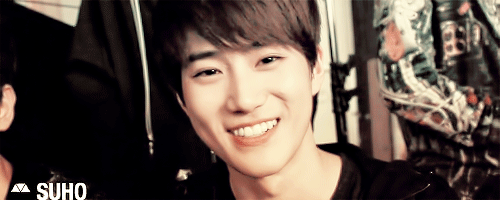
Ne - Sunbeam: major key aspect to spot an ENxP: they ALWAYS smile widely in pictures or videos. It’s their nature. They probably have the brightest, purest and more innocent smiles. They irradiate contagious happiness and make you want to smile as well. Usually their smile suggest they’re very friendly and ready to have fun. They seem to have nothing to hide, they come across as people ready to be wide open to you, although nothing far from reality, (my experience says ENxPs are one of the most introvert and secretive types among the “extraverted” ones). You can see the energy in their eyes, and they’re also very quick changing their facial expressions, so it’s pretty normal for them to just burst into laughs a moment after.
(ENFP and ENTP)


Se - Charm: I bet you were expecting something like “seduction” or “sex-appeal” I don’t know, but nope. Those are all stereotypes. Actually, Se-dom smiles are usually very soft, but with an obvious glimpse of charm. Their eyes tend to catch the receptor’s whole attention, -maybe ESTPs are more “intimidating” than ESFP while doing it, so I’m not sure-. Also, I’ve seen some kind of mix between the friendly Ne and the gentle Fi smile (we’ll get there later). When it comes to smiling, Se doms are not as shy as IxFP may be, but neither are as open as ENxP (tho at laughing they probably are). They give the impression of knowing they have your attention and want to keep it and to make sure they look appealing -not in a romantic or sexual way- to everybody around them.
(Both are ESFP)


Te - Amiability: this is a difficult one. ExTJ are not as intimidating as it is said they are, but yet, their smile doesn’t suggest especial emotional connection or understanding. However, since them and their dominant function are branded as “aggressive”or “bossy” when they smile they tear down that stereotype. Te users usually smile with a clever look in the eyes, staring directly at you. They’re saying “I trust you, I like you enough to smile at you like this” -we’re talking always about honest behaviours, of course-. I’ve seen a lot of Te-doms smiling even more widely than ESxPs, and I don’t have a theory for this, I guess they’re not especially interested in coming across as fancy, and since they tend to smile “less”, when they do it it means they are willing to build a relationship with you and even to let you know more about their inner selves -this is: deep down they’re the softest-.
(ESTJ and ENTJ)


Fi - Softntess: let’s say it: INFP and ISFP usually have the softest and sweetest smile ever. Whether they are more or less shy doesn’t matter because their facial expression seems always kind of bashful. They always show a discreet smile that possibly turns into a big one; sometimes they even have what is called “eye-smile”: you almost see more happiness in their eyes than in their lips, However, the relevant thing is: seeing them smile at you means knowing you have connected with them at some level. You have their full understanding and probably their esteem as well. I think it’s not so easy for a stranger to make them smile comfortably, so you should feel very appreciated when your IXFP smiles at you.
(Both ISFP)
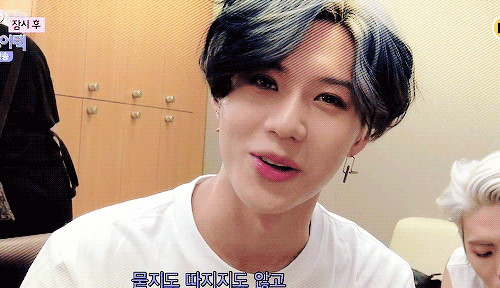

Ni - Relief: gathering gifs for this I’ve realized that Ni dom users tend to smile awkwardly (most INTJ) and shyly (most INFJ) 99% of the time, like, they don’t even get to show they theeh at all. So, seeing them half-laughing is probably more revealing since it is the result of a normally reserved and restrained person who finally has set himself/herself free. What I mean is: INxJs have often their heads in the clouds, they tend to overthink and overanalyse everything so they “don’t plan” to engage with the immediate atmosphere and just smile to come across as friendly or appealing (actually this especially goes for INTJs lmao). They seem to be always on the lookout or lost in their thoughts, so when they finally smile comfortably they’d probably laugh as well, finally connected to their outer world. Therefore, their facial expression is usually composed by an avoiding gaze (oh God why am I doing this) and a wide smile (oh my God I am really enjoying the moment). They seem relieved and maybe amazed about the situation or even about how they’re feeling at the moment.
(INTJ and INFJ)


Si - Engagement: it’s a weird word to describe it, I know, but It just came up to me. This is how I see ISxJs’ smiles: reserved but fulfilling. High Si users usually have a subtle expression which denotes gentleness -whatever ISTJs stereotypes may be-. Their smiles imply control and tidiness, or at least that’s what they seem to reflect. But I also see some sort of comfort, a different one from Fe users (well, in ISFJs that’s a little more difficult to explain) that’s why I thought about “engagement”. While Si users smile, then tend to make an especial eye-contact, between “I am delighted I’m this happy because of you/this” and “thank you”. This is some kind of commitment: “I’m not smiling just because, I’m smiling because I really feel it, I can’t find another way to express myself”.
(Both ISTJ)
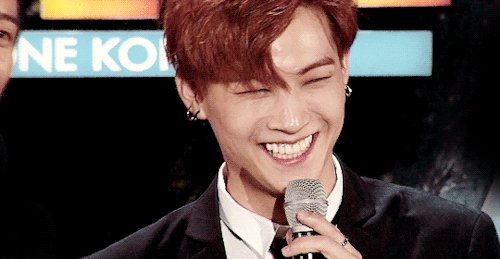

Ti - Containment: okay if Ni users are awkward smiling Ti users are even worse. Forget about what you know about shyness-as-a-personality-trait and focus on IxTPs’ smiles because it’s practically the representation of bashfulness. They often avoid the gaze, and probably if you see one Ti user smiling non awkwardly it’s because they found something funny or interesting, not for politeness or the sake of being nice. However, even in the most comfortable atmosphere among friends or relatives, their smile has always a glimpse of containment. But, still, I find IxTPs’ smiles very warm and sweet, maybe because they’re the result of someone who tries but can’t hold back their emotions anymore. (Just a casual observation: I don’t know why this two guys bend forward while smiling. It’s like they have to express their feelings with the body too but I guess that doesn’t need to suit for most of IxTPs.)
(Both ISTP)


#mbti#long post#all types#smiles#smiling#my theories#cognitive functions#se#te#ne#fe#si#ti#fi#ni#extraverted sensing#extraverted thinking#extraverted intuition#extraverted feeling#introverted feeling#introverted intuition#introverted sensing#introverted thinking#esfp#estp#entp#enfp#estj#entj#enfj
817 notes
·
View notes
Text
MBTI and Fitness

Okay. So. First of all -- huge thank you to every single person who reblogged or messaged me or the blog or answered the post about fitness habits.
I really, really wanted to make a great post like “MBTI types as workouts” or something but here’s the thing:
There truly is no correlation between MBTI type and workouts.
Not even really in any generalizations like “Te and Fe prefer structure” or “Ne and Se prefer random, sporadic and intense workouts.” Introverts and extroverts, intuitives and sensors, feelers and thinkers, perceivers and judgers... Everyone seems to like all sorts of workouts.
I’m sorry if you were one of the people looking forward to the post. I just can’t make it knowing I’d have to fudge the data. I guess our motivations and cognitive functions in regards to fitness are wholly unique. Which in itself is actually an interesting take away.
I’ll try to do more surveys like that in the future though -- it was well received and I think there’s more to learn yet! (And cheers to all of you who are taking steps to stay fit - that’s awesome!)
- ESTJ Mod
73 notes
·
View notes